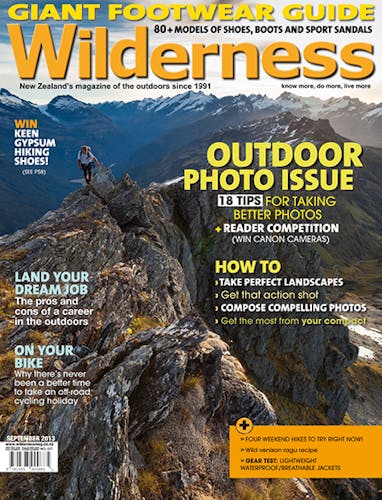In the press release issued by DOC to announce the appointment of Lou Sanson as DOC’s new director general, there was plenty about Sanson being the right man for the job: he’s got the ‘intellectual capability, strategic leadership, policy experience, change management skills, and personal qualities to be successful in the role’, we were told.
And while he has proven his ‘commitment to conservation’ he also ‘possesses the focus to roll out the new business model and required shift in culture and practice’.
Sanson might very well be the man for the job. His appointment was welcomed by recreation and conservation groups, but seeing as there was no mention at all of his ability to ‘foster recreation’ or ‘manage for conservation purposes all land and natural and historic resources held under the Conservation Act’, it seems fair to assume his government-mandated brief will be to continue to foster business ‘partnerships’, not the legally-mandated stuff like conserving our native species and encouraging people into the great outdoors.
Business partnerships can be a good thing. The sea kayaking or hiking guides that make use of our national parks provide unique visitor experiences that tourists rave about when they get back home. They tend to be found on Great Walks or in front country areas where you can soon leave them behind if you so wish. These companies also provide jobs and their concessions fees help DOC fight pests and upgrade facilities.
At the other end of the spectrum are the large corporate ‘partners’ helping to fund the painting of huts or the trapping of pests on Great Walks. I think all would agree these are important jobs, but here’s the rub: compared to the small, locally-based guiding companies, these corporations provide no jobs nor do they offer any measurably better experience for visitors. The work they’re funding would have been done anyway by DOC or, as is increasingly likely, volunteers. And unlike the many volunteers who donate their time and money to eradicating pests on the conservation estate, these corporations are looking for some payback, namely increased brand awareness and good PR which translates into increased sales further down the line. Inevitably, we see their logos plastered all over the place, even on hut walls.
Isn’t one of the joys of going bush getting away from the marketing hype and PR machinations that threaten to overwhelm us in our everyday lives? Is it too much to ask to be allowed to escape the bombardment for a day?
I could be a lone voice here, and I certainly don’t pretend to have the answers. But perhaps one of Sanson’s first jobs could be to lead a serious debate on how our conservation and recreation areas are funded in the future. Do we want greater involvement from private business, or would we prefer alternative methods to funding DOC’s important work?
The reality is, under current policy any alternative will require more user pays. And that won’t please everyone, if anyone.
Some ideas about this have been around for years, such as implementing a ‘park tax’ collected at the border on all foreign tourists. But the debate cannot be just about foreign visitors – it needs to go further and discuss what we all can do. For instance, would it bother you to pay a gold coin fee every time you entered a national, forest or conservation park? How would you react to donation boxes put at the start of every trail where all money collected would go towards that specific trail’s upkeep? Should all foreign tourists staying more than 30 days be made to purchase a six month $92 Hut Pass? Should DOC axe the 30 per cent discount on Hut Passes offered to outdoor groups such as the FMC, NZ Deer Stalkers, Scouts and Girl Guides? Can DOC be persuaded to build smaller, cheaper and less comfortable huts?
I’m keen to hear your ideas and thoughts, so drop me an email and head over to our website where we’re running a survey on this issue.
Minister of Conservation Nick Smith is to be congratulated for declining the Routeburn Tunnel project. Now he must decline the proposed monorail development. If the proposal could get people to Milford Sound more quickly than current transport options, it might, despite its incursion into a World Heritage Area, have a shaky leg to stand on. But because it involves a ridiculously convoluted series of transportation methods, this is unlikely. Therefore Snowdon Forest and the World Heritage Area must be preserved and the monorail declined.







